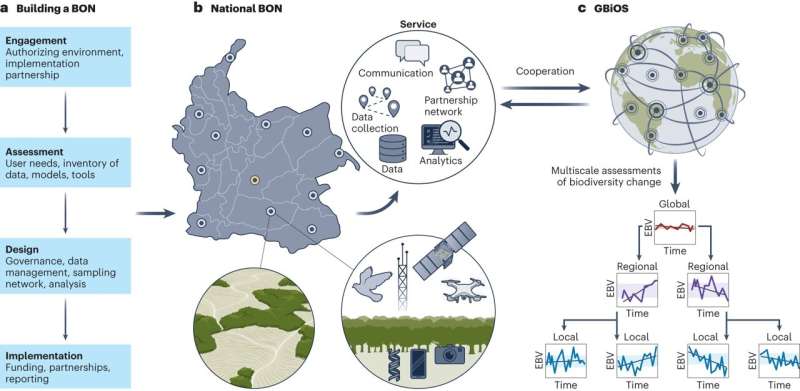This article has been reviewed according to Science X's editorial process and policies. Editors have highlighted the following attributes while ensuring the content's credibility:
fact-checked
peer-reviewed publication
trusted source
proofread
Researchers propose a global observatory to monitor Earth's biodiversity

At a time of nature crisis driven by unparalleled rates of biodiversity loss, a new interconnected system to monitor biodiversity around the world is urgently needed to direct and focus conservation action.
"The lethal combination of habitat loss, the exploitation of natural populations, pollution, and climate change is causing species extinction rates not seen since the last mass extinction 65 million years ago," said Prof. Andrew Gonzalez, Liber Ero Chair in Conservation Biology at McGill University, and co-Chair of GEO BON. "We lack the means to monitor these impacts fast enough across most areas of the planet."
Operating much like the existing global network of weather stations that monitor climate change and its impacts, the Global Biodiversity Observing System (GBiOS), is a proposal developed by scientists from the Group on Earth Observations Biodiversity Observation Network (GEO BON), and its partners, that will combine technology, data, and knowledge from around the world to foster collaboration and data sharing among countries and to provide the data urgently needed to monitor biodiversity change and target action.
GBiOS can galvanize collaboration on the critical issue of biodiversity data access, sharing, and equitable use.
"It can provide the information we need at the pace we need it to support countries as they make progress towards their biodiversity goals," said Prof. Alice Hughes, Associate Professor at The University of Hong Kong, and one of the dozens of scientists who collaborated to develop the proposal for GBiOS.
GBiOS is a missing piece of the science-policy puzzle needed to support the Kunming-Montreal Global Biodiversity Framework agreed upon at the COP-15 conference in Montreal last year, contributing to a representative and inclusive understanding of biodiversity change and supporting effective implementation of policies that are designed to reverse biodiversity loss and achieve the global goals for nature in the coming decades.
More information: Andrew Gonzalez et al, A global biodiversity observing system to unite monitoring and guide action, Nature Ecology & Evolution (2023). DOI: 10.1038/s41559-023-02171-0
Journal information: Nature Ecology & Evolution
Provided by McGill University




















